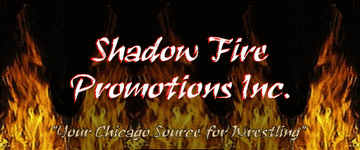
UNIVERSAL WRESTLING FEDERATION
(UWF)
(Herb Abrams)
1990-1995
/UWFAbramslogo.jpg)

/UWFAbramslogo.jpg)
The Universal Wrestling Federation (UWF) was founded in 1990 by Herb Abrams in Marina del Rey, California with hopes of returning professional wrestling back to its roots of more in-ring action and less gimmicks, the opposite of what was being presented on television at the time by the two major promotions, the World Wrestling Federation (WWF) and World Championship Wrestling (WCW).
He named the promotion the Universal Wrestling Federation, or UWF, the same name as used previously by former wrestler and promoter Bill Watts, and allegedly was able to trademark the UWF name in June 1991 because Bill Watts did not trademark the name of his version of the Universal Wrestling Federation that was sold to Jim Crockett Promotions in 1987, and when Crockett absorbed Watts' promotion into his, he saw little need to trademark the name, perhaps short-sightedly not realising the value in the intellectual property, during the home video market boom, especially at a time when the WWF was releasing home videos through their video distribution arm of Coliseum Video on a regular basis.
Abrams signed some of the top talent of the last several years, such as "Mr. Wonderful" Paul Orndorff, who had a long series of matches against Hulk Hogan when Orndorff was in the WWF; "Dr. Death" Steve Williams, a huge star in Japan and Bill Watts' UWF; Bam Bam Bigelow, Don Muraco, "Ace" Cowboy Bob Orton, Brian Blair, Danny Spivey, Billy Jack Haynes, and Ken Patera, who were all recently off WWF runs; Colonel DeBeers, who was last in the American Wrestling Association (AWA) just before the company folded; and veterans Ivan Koloff, Bob Backlund, and Cactus Jack, among others. He also recruited former wrestler Bruno Sammartino as a commentator, with the promise of putting Bruno's son, David on the UWF roster, something he had done when he was last in the WWF; former WWF commentator Craig DeGeorge, who would also work at the commentary desk; and retired wrestler John Tolos, who also had just recently left the WWF as a manager.
The UWF started out on the right foot, securing a deal with national cable network SportsChannel America in 1990, débuting a weekly program called Fury Hour in October 1990 that ran until 1993 and also featured matches from the Wild Women of Wrestling promotion. Also in 1993, the promotion secured a home video deal. When the UWF's original television deals ran out in 1995, the promotion secured new television deals with both SportsChannel America and Prime Network.
However, despite the ambitious start, there were internal problems that would lead to the demise of the promotion. With limited knowledge of how to run a wrestling promotion, and a lack of attendance and revenue to keep the talent under contract, in addition to the costs of keeping up the weekly television tapings, the company would soon run out of funds. Also, problems between the talent as well as personal problems with Abrams would also soon spell the inglorious end to the second UWF.
On September 23, 1994, live from the MGM Grand Garden Arena in Las Vegas, Nevada, the UWF aired their first and last live pay-per-view event, Blackjack Brawl. Unfortunately, the same low attendance and buy rate problems that plagued the promotion would seal its fate. Existing episodes of the Fury Hour were repackaged to a half-hour format and aired on ESPN2. Any hope of the promotion pulling itself out of its financial hole ended with the untimely death of founder/promoter Herb Abrams in July 1996, making Blackjack Brawl the final UWF show.
The UWF tape library is alleged to be owned by former UWF wrestler Al Burke, who partnered with Todd Okerlund (son of former American Wrestling Association (AWA) and WWF announcer "Mean" Gene Okerlund) of Classic Wrestling to repackage and license the library through DirecTV and ESPN Classic Canada, with the latter airing the original one-hour episodes of Fury Hour in 2004. ESPN Classic began re-airing original episodes of the Fury Hour between January and March 2008. As of 2015, UWF programming is no longer airing in the U.S.
/siteforumslogo.png) UWF VIDEOS |
